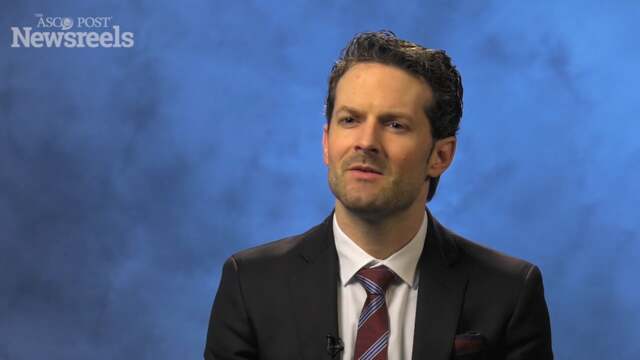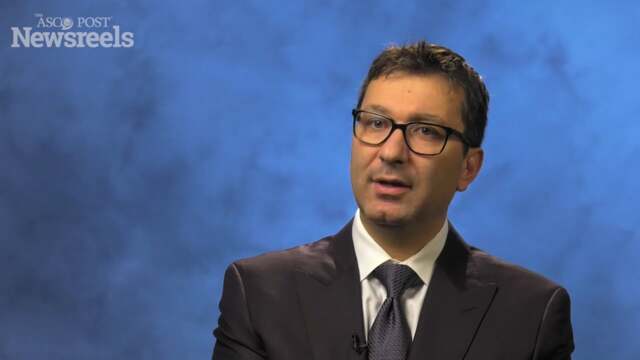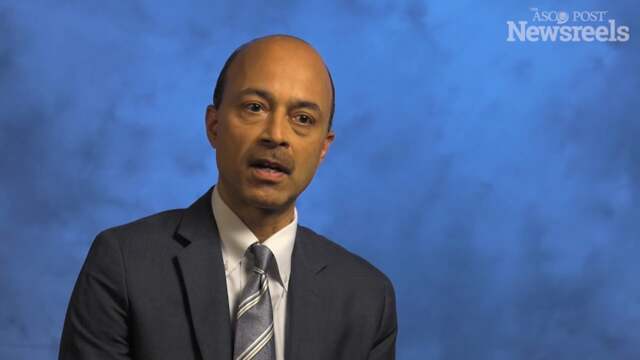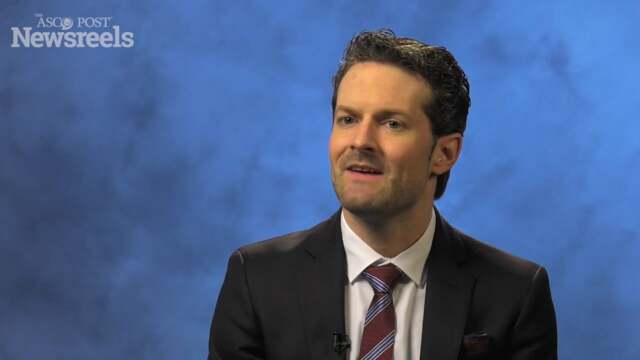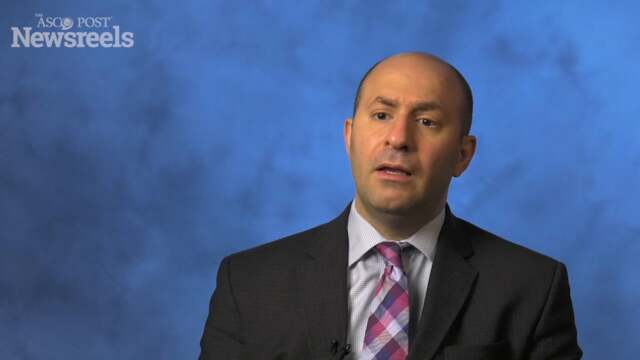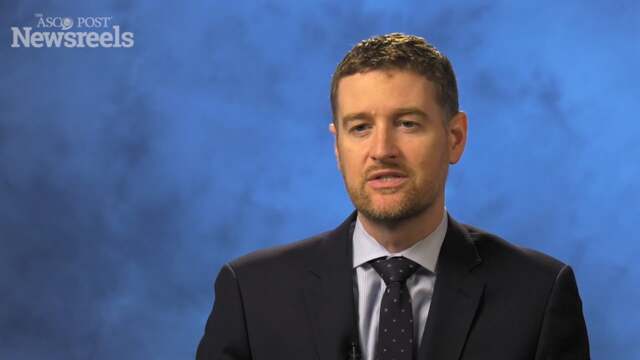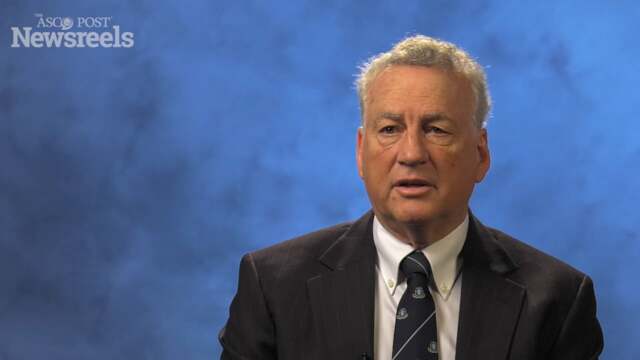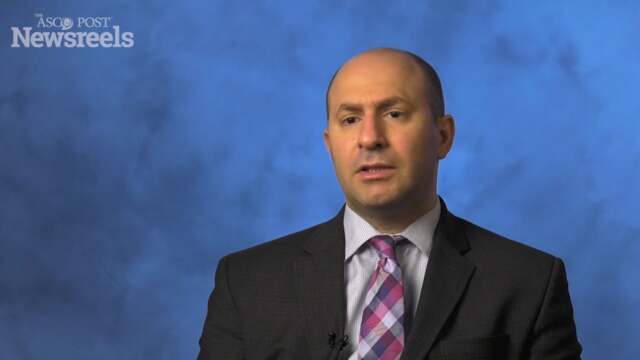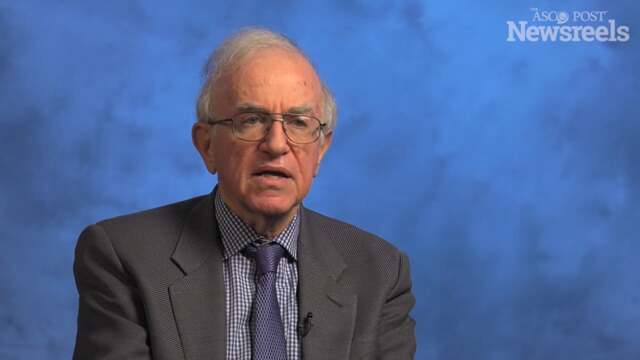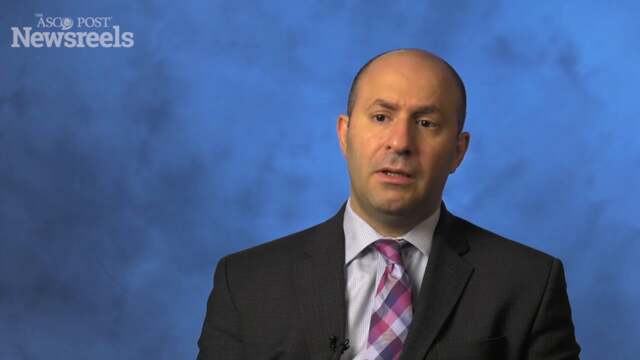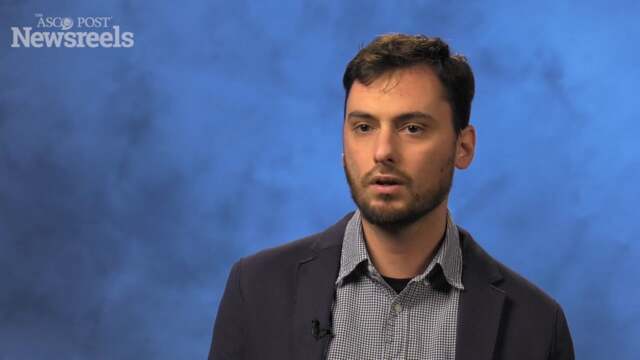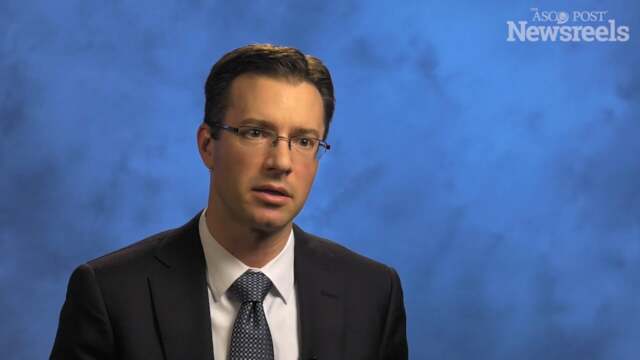2017 Genitourinary Cancers Symposium
Expert Point of View: Eric Jonasch, MD
Eric Jonasch, MD, Professor in the Department of Genitourinary Cancer at MD Anderson Cancer Center in Houston, commented on this phase II study. “This is an important study, since we have, for the fi...
Combination of Atezolizumab and Bevacizumab in PD-L1–Positive Patients With Metastatic Kidney Cancer
The combination of atezolizumab (Tecentriq) and bevacizumab (Avastin) appears to be promising in the first-line treatment of patients with metastatic renal cell carcinoma, according to results of a ph...
Expert Point of View: Prof. Noel Clarke, MBBS, FRCS, ChM
Formal discussant of the 111 trial, Prof. Noel Clarke, MBBS, FRCS, ChM, The Christie Hospital, Manchester, UK, had some concerns, but overall felt that the study could be practice-changing. “In this ...
One Cycle of BEP as Good as Two in High-Risk Testicular Cancer
The approach to treatment of high-risk, clinical stage I, nonseminomatous or combined germ cell tumors of the testis is not written in stone. Orchiectomy followed by surveillance or chemotherapy with...
Progress in Defining Molecular Signature for Aggressive Androgen-Indifferent Prostate Cancer
Prostate cancer has lagged behind breast cancer in the identification of predictive and prognostic biomarkers, but the field is catching up. Researchers have identified a molecular signature that can ...
Cryoablation for Small Renal Tumors: One Radiologist’s Experience
In a separate talk at the 2017 Genitourinary Cancers Symposium, Thomas Atwell, MD, a radiologist at the Mayo Clinic, Rochester, Minnesota, who performs ablation, discussed his experience with cryoabl...
Expert Point of View: Alessandro Volpe, MD
Formal discussant of this abstract, Alessandro Volpe, MD, of the University of Eastern Piedmont Hospital, Maggiore Della Carita Hospital, Novara, Italy, commented that nephron-sparing surgery is reco...
Evolving Role for Cryoablation in Treating Small Renal Masses
Selected “healthy” patients with clinical T1 renal cell carcinoma may be safely treated with percutaneous cryoablation, according to a single-center study of experience at the Mayo Clinic.1 “In healt...
Expert Point of View: Joseph Greer, PhD
“These data are consistent with other studies we have conducted in advanced lung cancer, in which we similarly found that one-third of patients believed that their metastatic lung cancer was curable....
Aligning Patient Expectations With Treatment Goals in the Metastatic Setting
More than one-third of men with incurable metastatic prostate cancer mistakenly believe that their cancer may be curable, according to a survey of patient expectations at an academic cancer center. “...
Active Surveillance Appears to Be Safe for Small Renal Masses
The prospective Delayed Intervention and Surveillance for Small Renal Masses (DISSRM) registry shows that over the intermediate term, active surveillance appears to be as safe as primary intervention ...
No Benefit From Older Standard-of-Care Drug in Adjuvant Chemotherapy for High-Risk Prostate Cancer, but Newer Trials Feasible
An older trial designed to evaluate the benefits of adjuvant therapy following radical prostatectomy in patients with high-risk prostate cancer showed no difference in overall or disease-free survival...
Phase II Trial Evaluates New Gene Therapy for Non–Muscle Invasive Bladder Cancer After BCG
A novel approach using intravesical gene therapy showed promising activity in a phase II trial that enrolled patients with bacillus Calmette-Guérin (BCG)-refractory or -relapsed nonmuscle invasive bla...
Roland Seiler, MD, on Bladder Cancer: Subtypes and Treatment Response (German Language Version) 
Roland Seiler, MD, of the University of British Columbia, discusses in German a way to identify molecular subtypes of muscle-invasive bladder cancer, the varying responses to cisplatin-based neoadjuva...
Karim Chamie, MD, on Bladder Cancer: Optimizing Surgical and Medical Therapies
Karim Chamie, MD, of the University of California, Los Angeles, discusses induction and maintenance BCG therapy in non–muscle-invasive bladder cancer.
Guru Sonpavde, MD, on Prostate Cancer: Targeting DNA Alterations
Guru Sonpavde, MD, of the UAB Comprehensive Cancer Center, discusses his study on circulating tumor DNA alterations in metastatic castration-resistant prostate cancer and the therapeutic direction the...
Roland Seiler, MD, on Bladder Cancer: Subtypes and Treatment Response
Roland Seiler, MD, of the University of British Columbia, discusses a way to identify molecular subtypes of muscle-invasive bladder cancer, the varying responses to cisplatin-based neoadjuvant chemoth...
Sumanta K. Pal, MD, on Advanced Renal Cancer: Treatment Challenges
Sumanta K. Pal, MD, of the City of Hope, summarizes a session he co-chaired on the opportunities and challenges in systemic therapy for advanced renal cancer, including imaging as a biomarker of respo...
Paul L. Nguyen, MD, on Prostate Cancer: Active Surveillance
Paul L. Nguyen, MD, of the Dana-Farber Cancer Institute, summarizes a session he co-chaired, which included discussion of Canadian vs U.S. guidelines; ProtecT; genomic and hereditary tests; and imagin...
Rana R. McKay, MD, on RCC: Continuing Benefit After Halting Treatment
Rana R. McKay, MD, of the University of California, San Diego, discusses study findings on PD-1/PD-L1 responders with metastatic renal cell carcinoma who discontinue therapy for immune-related adverse...
W. Marston Linehan, MD, on Renal Cell Carcinoma: Genetic Predisposition
W. Marston Linehan, MD, of the National Cancer Institute, discusses the genetic basis of the different types of kidney cancer, which provides the key to clinical management.
Sumanta K. Pal, MD, on RCC and Tumor Profiling
Sumanta K. Pal, MD, of the City of Hope, discusses the evolution of circulating tumor DNA profile from first-line to second-line therapy in metastatic renal cell carcinoma. (Abstract 434)
Paul L. Nguyen, MD, on Predicting Metastasis and Mortality
Paul L. Nguyen, MD, of the Dana-Farber Cancer Institute, discuses an evaluation of the Decipher prostate cancer classifier to predict metastasis and disease-specific mortality from genomic analysis of...
Toni K. Choueiri, MD, on Untreated RCC: Phase II Trial Results
Toni K. Choueiri, MD, of the Dana-Farber Cancer Institute, discusses study findings on atezolizumab with or without bevacizumab vs sunitinib in patients with untreated metastatic renal cell carcinoma....
Joshua M. Lang, MD, on Prostate Cancer: Best of the Journals
Joshua M. Lang, MD, of the University of Wisconsin Carbone Cancer Center, discusses genomic alterations in DNA damage–repair pathways––more common in patients with prostate cancer than previously reco...
Emma Hall, PhD, on Bladder Cancer: Results From the BC2001 Trial
Emma Hall, PhD, of the Institute of Cancer Research, London, discusses long-term outcomes with chemoradiotherapy vs radiotherapy alone, and standard vs reduced high-dose volume radiotherapy in muscle-...
L. Michael Glodé, MD, on Prostate Cancer: Results From SWOG S9921
L. Michael Glodé, MD, of the University of Colorado Cancer Center, discusses study findings on adjuvant androgen deprivation vs mitoxantrone plus prednisone plus ADT in high-risk prostate cancer patie...
George J. Bosl, MD, and Karim Fizazi, MD, PhD, on Germ Cell Tumors and Treatment Intensification: Pros and Cons
George J. Bosl, MD, of Memorial Sloan Kettering Cancer Center, and Karim Fizazi, MD, PhD, of Gustave Roussy and the University of Paris Sud, offer the “pro” and “con” viewpoints for treatment intensif...
Toni K. Choueiri, MD, on Papillary RCC: Phase II Trial Results
Toni K. Choueiri, MD, of the Dana-Farber Cancer Institute, discusses a single-arm biomarker-based study of savolitinib in patients with advanced papillary renal cell cancer. (Abstract 436)
Charles G. Drake, MD, PhD, on Prostate Cancer and Immunology: Expert Perspective
Charles G. Drake, MD, PhD, of Columbia University Medical Center, summarizes his keynote lecture on immunotherapy as a new frontier in prostate cancer and its synergistic use with traditional treatmen...
Lawrence H. Einhorn, MD, on Testicular Cancer: The Keynote Lecture
Lawrence H. Einhorn, MD, of the Indiana University Simon Cancer Center, summarizes his keynote lecture on the controversies in management of clinical stage I testicular cancer and the long-term conseq...
Toni K. Choueiri, MD, on Urothelial Cancer: Trial Results From Borealis-2
Toni K. Choueiri, MD, of the Dana-Farber Cancer Institute, discusses study findings on apatorsen plus docetaxel vs docetaxel alone in platinum-resistant metastatic urothelial cancer. (Abstract 289)
Joshua Armenia, PhD, on Prostate Cancer: Recent Discoveries
Joshua Armenia, PhD, of Memorial Sloan Kettering Cancer Center, discusses new information that is changing the understanding of prostate cancer, including the identification of a new subclass, which r...
Brian C. Allen, MD, on Assessing Tumor Response: Standard-of-Care vs Computer-Assisted Evaluation
Brian C. Allen, MD, of Duke University Medical Center, discusses the benefits of using a computerized process that provides step-wise guidance, decreases interpretation time, and reduces errors when m...
2017 GU Cancers Symposium: Atezolizumab Plus Bevacizumab Shows Potential in Metastatic Renal Cell Carcinoma
Results from the phase II IMmotion150 study that compared atezolizumab (Tecentriq) plus bevacizumab (Avastin) and atezolizumab monotherapy to sunitinib (Sutent) alone in patients with previously untre...
2017 GU Cancers Symposium: Updated Efficacy and Tolerability of Durvalumab in Locally Advanced or Metastatic Urothelial Carcinoma
At the 2017 Genitourinary Cancers Symposium, Powles et al presented updated efficacy and safety data for durvalumab in patients with locally advanced or metastatic urothelial cancer (Abstract 286). U...
2017 GU Cancers Symposium: In Advanced Kidney Cancer, Antibiotic Use Lowers Efficacy of Immunotherapy
A new retrospective analysis suggests that immunotherapy may be less effective in patients who receive antibiotics less than a month before starting treatment. In the study, cancer worsened more quick...
2017 GU Cancers Symposium: Some Patients With Renal Cell Carcinoma Experience Long-Term Tumor Control Even After Stopping Immunotherapy Early
Early findings from a new study appear to challenge the current standard practice for immune checkpoint inhibitor therapy—continuing treatment until cancer worsens. Among patients with advanced ...
2017 GU Cancers Symposium: Blood Test Uncovers Potential New Treatment Targets in Advanced Prostate Cancer
Analysis of free-floating cancer DNA from blood samples has yielded leads for new prostate cancer treatment targets. Using a commercially available “liquid biopsy” test in patients with ad...
